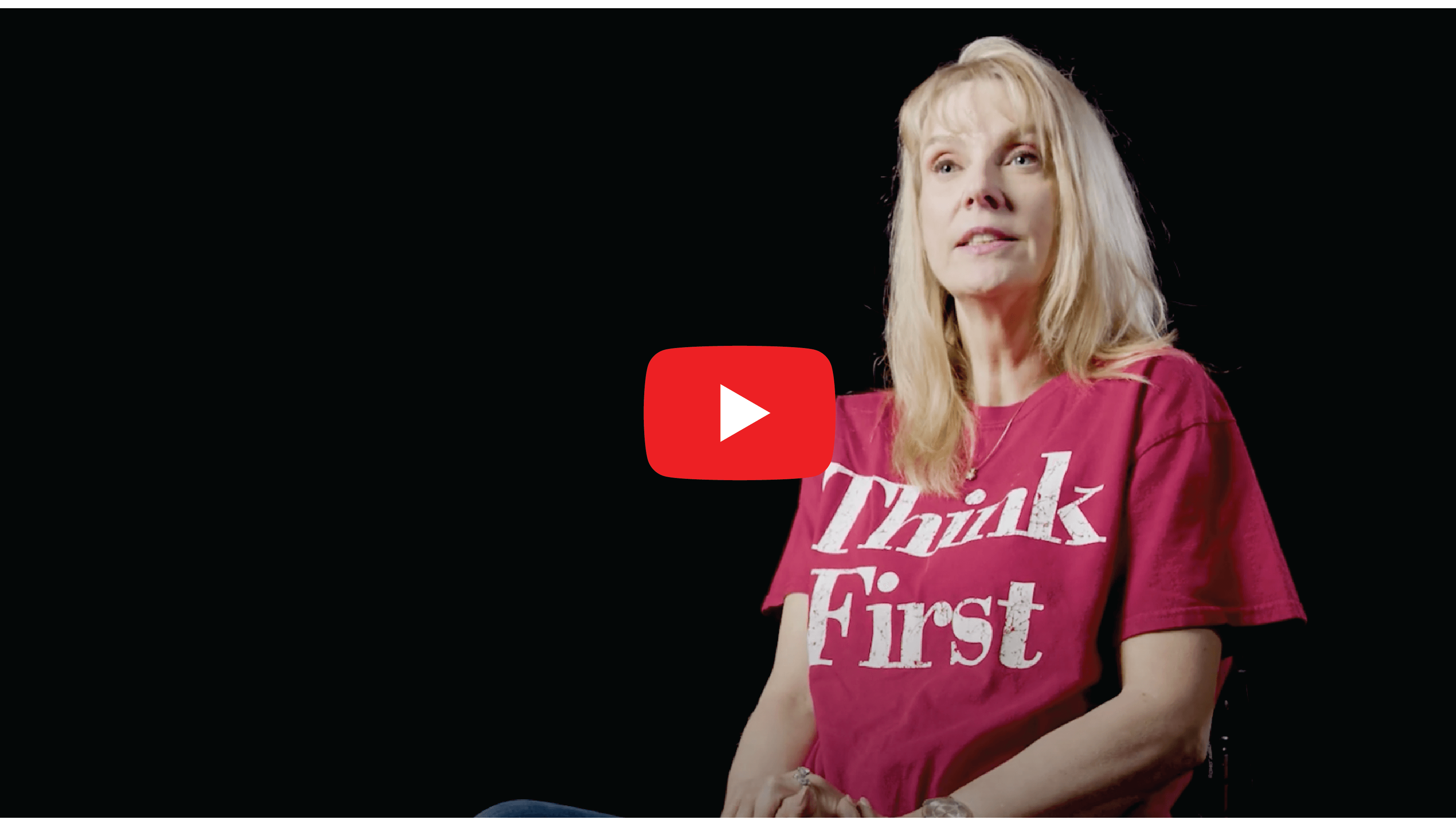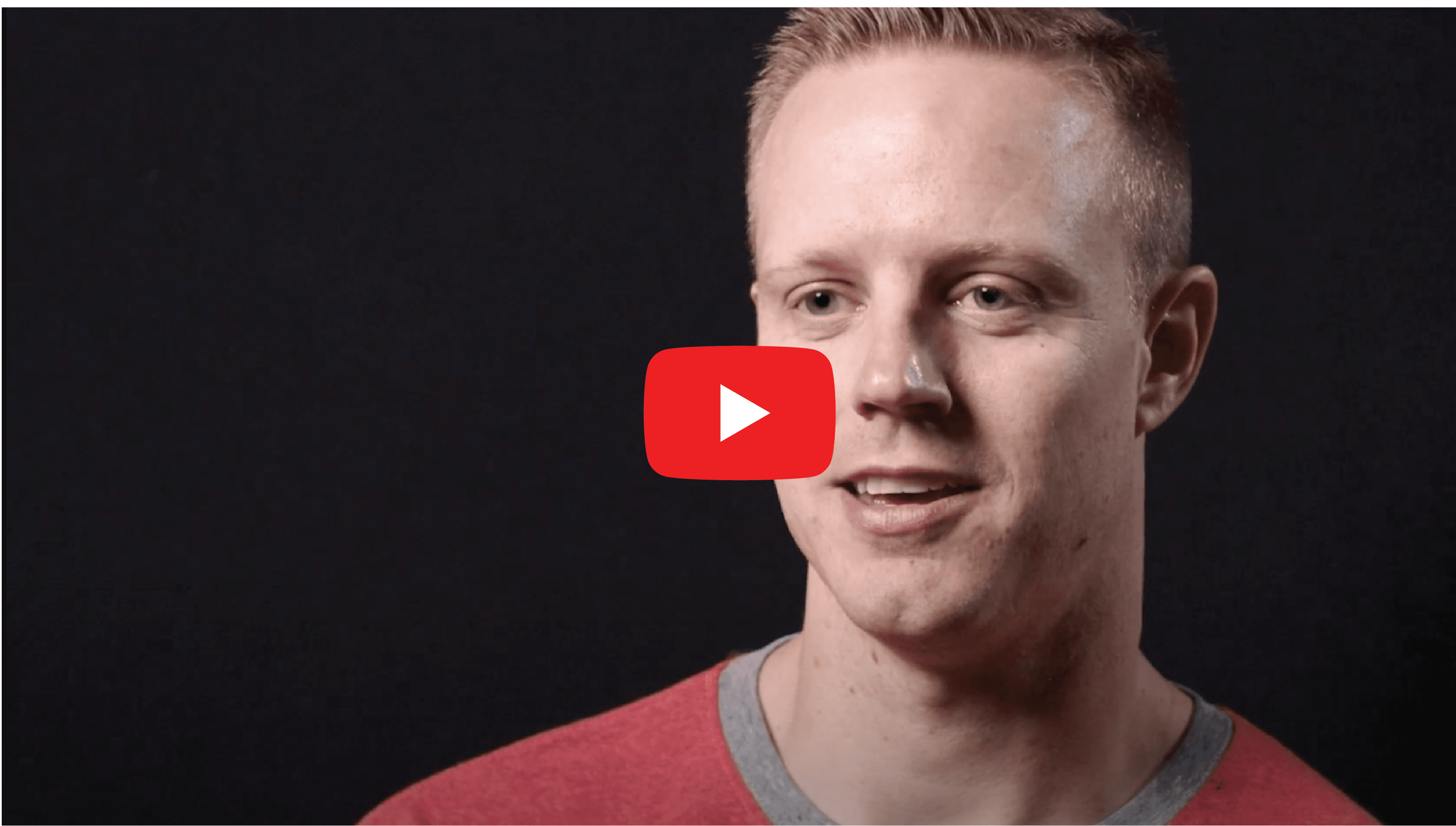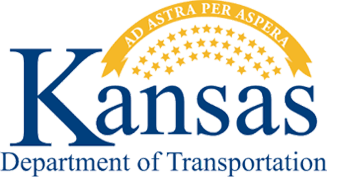ThinkFirst of Greater Kansas City is The Research Foundation's largest effort to provide injury prevention education ot youth in our community.
- Learn More About ThinkFirst
- Host a Program
- Meet Our Speakers
- View a List of Our Awards
- Donate to ThinkFirst
ABOUT THINKFIRST
ThinkFirst of Greater Kansas City is part of a national, award-winning injury prevention program presented by inspiring survivors of brain and spinal cord injuries. Through compelling, firsthand testimonies, youth learn about the consequences of careless decisions and how injuries can happen to anyone. These sobering yet motivational messages urge youth to take personal responsibility and make safe choices.ThinkFirst of Greater Kansas City provides 45-minute, free school-based presentations for youth grades kindergarten through high school throughout the Greater Kansas City metropolitan area. The presentations are age appropriate and cover a variety of topics including distracted driving, promoting seat belt usage, sports and recreation safety, helmet usage, motor-vehicle safety, water safety, and avoiding violence. Thousands of youth in Greater Kansas City hear the ThinkFirst injury prevention message each year.
-
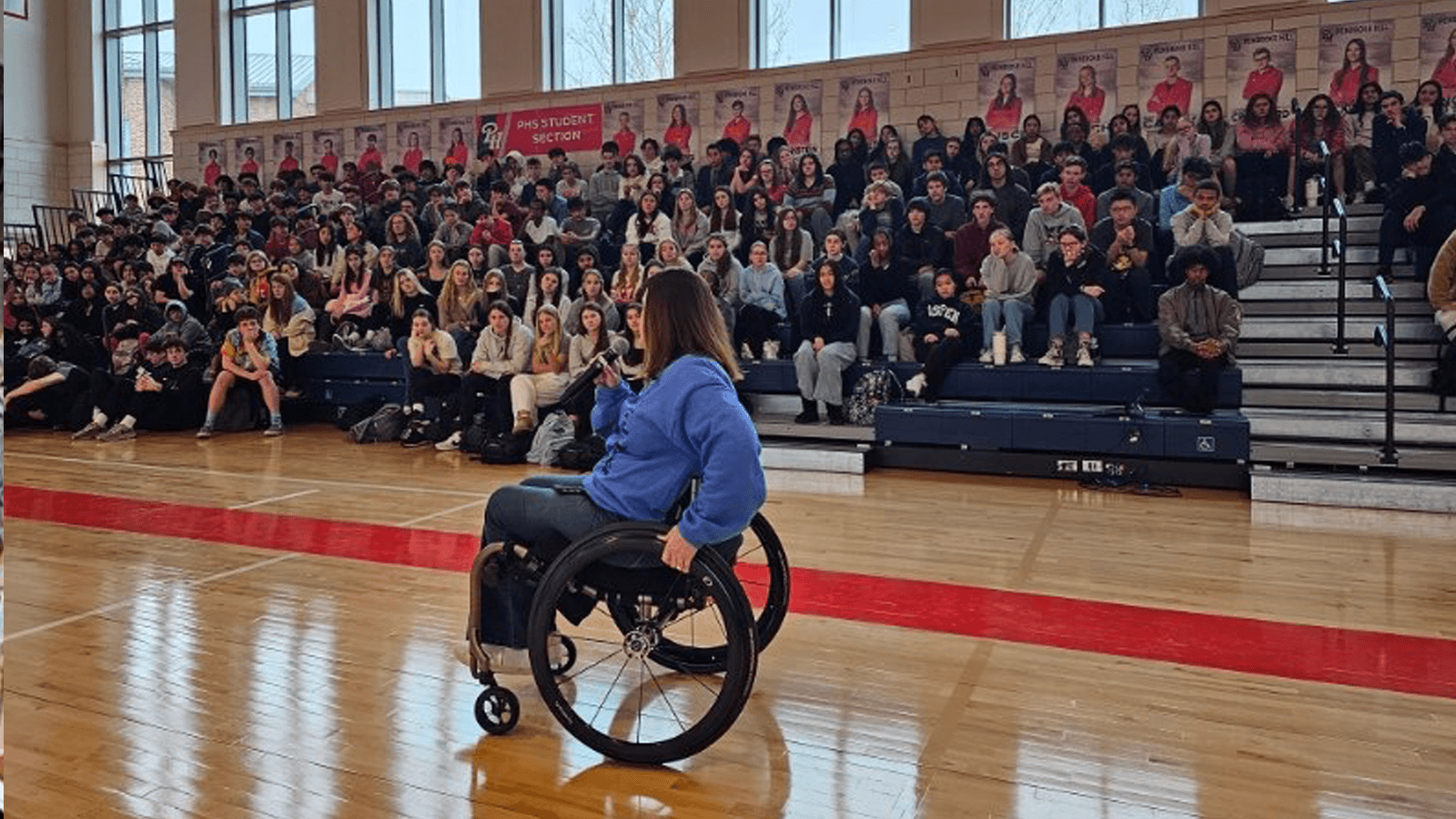
"Our presenters were informational, appropriate for grade level and age, caring, and inspirational. We were impressed with their desire to help others avoid the trauma they have been through and be able to do so in such a professional way."
-
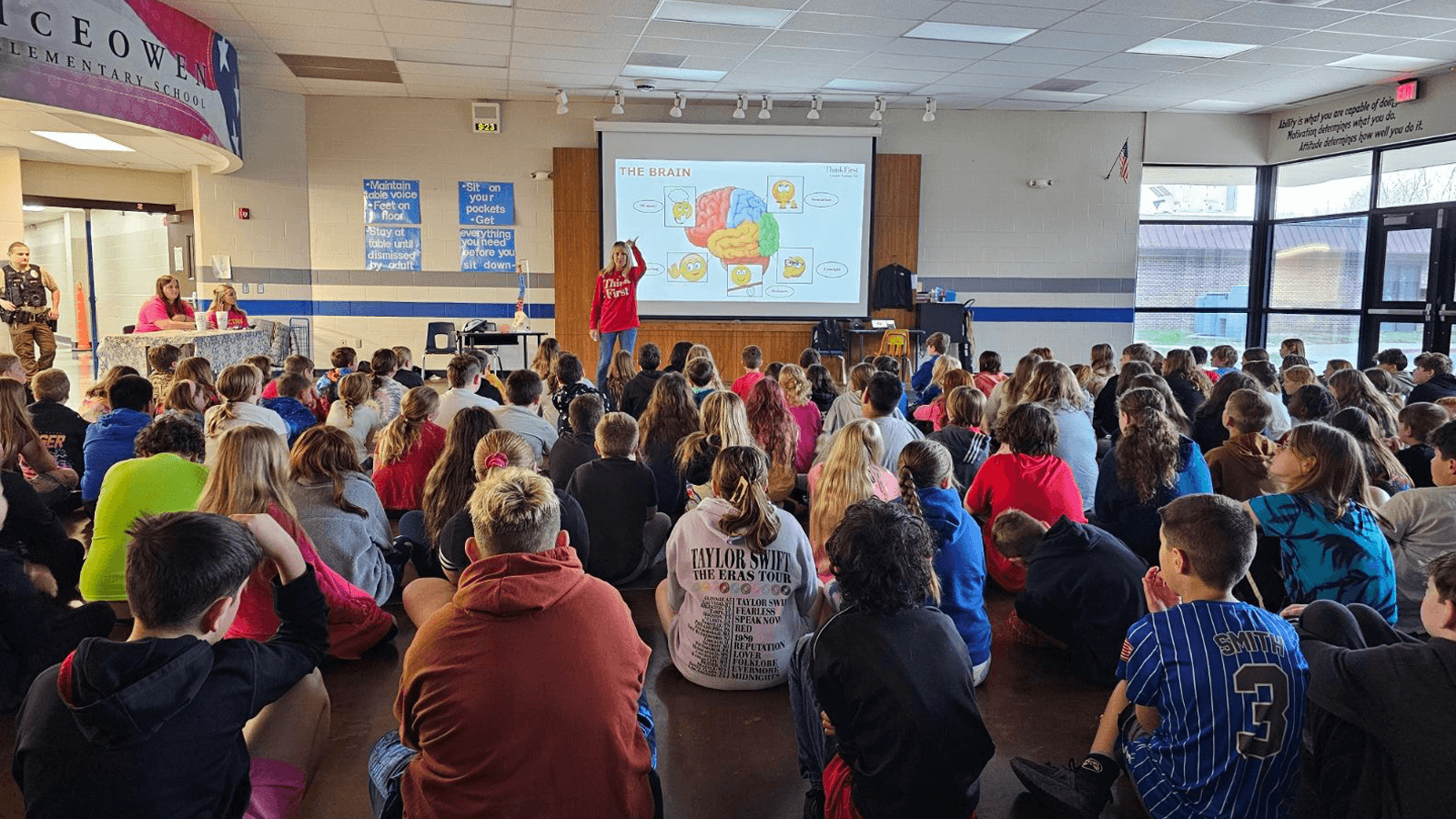
"The speakers talk to the students instead of talking at them to keep them engaged. They also ask questions that are thought provoking for our students to think about."
-
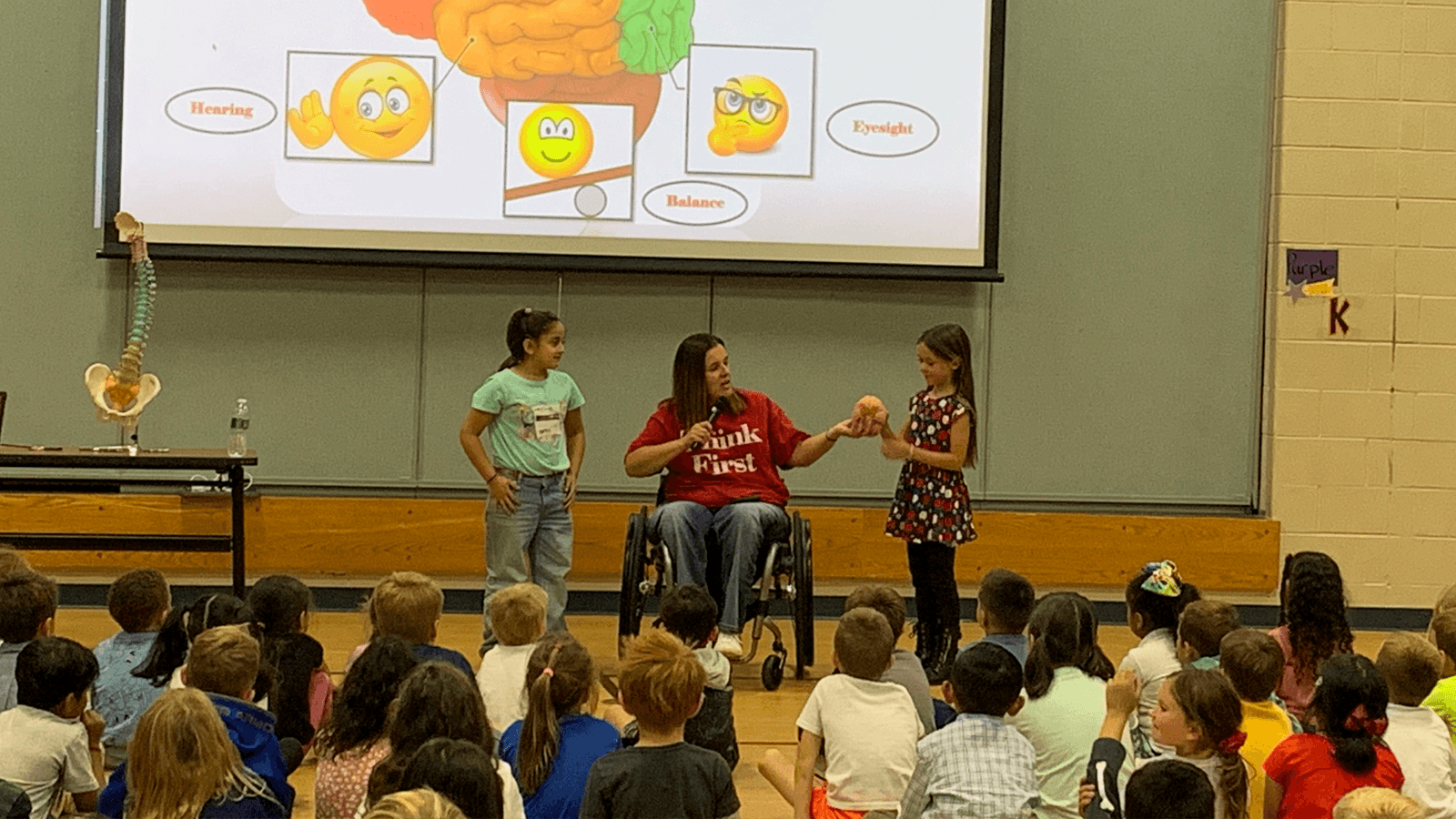
"I have heard several people comment since the presentation that they are being more aware of safety, putting phones down while driving, and wearing seatbelts. The stories are real, relevant and accessible to our teen drivers."
View a list of schools who have hosted a ThinkFirst of Greater Kansas City program.
MEET OUR SPEAKERS
Health Educators
A health educator explains the basic anatomy of the central nervous system and the permanent physiological changes caused by a brain or spinal cord injury.
-
Kelly

Kelly's History with Health Care
While Kelly isn't a healthcare professional, she does hold a bachelor’s degree in health and exercise science with a minor in psychology as well as a master’s degree in disability studies. She also has an advanced certification in disability law and policy and is certified as an Army Master Resilience Trainer. Kelly knows a great deal about spinal cord injuries because she sustained one in a serious car crash in 1998.Why ThinkFirst?
Kelly started speaking for ThinkFirst as a VIP in 2000 because she wanted to share her personal story - a cautionary tale about the consequences of driving recklessly and not following traffic safety laws. Since she has a permanent spinal cord injury as a result of not wearing a seat belt, discussing the importance of seat belt use with young people is important to her. Over the years, Kelly has learned a great deal about safety through research and she is able to effectively pass along that knowledge to children and teens by delivering persuasive presentations. Injury prevention is an important part of her life. -
Mary Beth
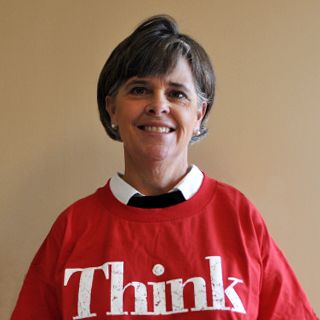
Mary Beth's History with Health Care
Mary Beth has an extensive career in health care. She was an ICU and cardiac rehabilitation nurse at Baptist Medical Center, a cardiovascular nurse clinician at St. Luke's Hospital and has experience as a home health nurse. She was a volunteer school nurse at St. Elizabeth Catholic School and a staff nurse for the Score 1 for Health program at Kansas City University of Medicine and Biosciences. Mary Beth has also worked with a travel and immunization clinic and is a certified Pietra Fitness instructor.Why ThinkFirst?
Mary Beth is passionate about health and wellness education. She enjoys working with children and believes that ThinkFirst is an excellent program with an extremely important message. -
Renee

Renee's History with Health Care
Renee’s career has been in the cruise industry with areas of expertise in project management, development of sales training programs, managing training teams for a major cruise line, and, of course, travelling the world. Renee recently retired and had the desire to be more involved in the community — serving others, making a difference, and providing support to the ThinkFirst program.Why ThinkFirst?
Renee has volunteered for ThinkFirst events in the past and wanted to get more involved to play a role in preventing spinal cord and brain injuries among young people. It’s a way for her to give back and be a part of a program that truly makes an impact. -
Sarah
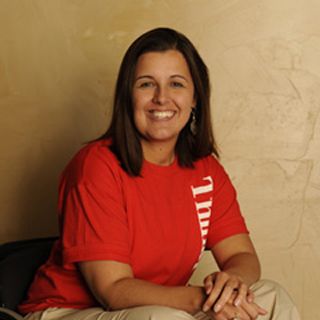
Sarah's History with Health Care
Sarah spent 13 years at Cerner Corporation, a healthcare IT company using technology that enables communities and people to engage in their own health. In her 23 years of providing health education experience through ThinkFirst, she has spoken to tens of thousands of students. Because Sarah experienced her own spinal cord injury as a teenager, she has extensive first-hand experience to share – from the initial acute care phase of an injured person, to rehabilitation and post-injury life.Why ThinkFirst?
Sarah has a passion for making an impact and she believes there is no greater way to accomplish that impact than through prevention. the ThinkFirst program is a highly-engaging way to educate students of all ages that their choices matter. Sarah is honored she can use her personal experiences to prevent students from suffering an injury like hers.
VIP Speakers
ThinkFirst of Greater Kansas City VIP speakers describe life before their injury, explain how their injury occurred and how it could have been prevented, and share what it's like to be young and live with a disability. Learn more about becoming a ThinkFirst of Greater Kansas City VIP speaker here.
-
Andrew
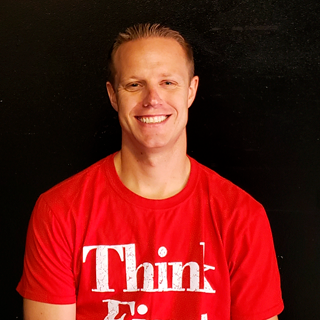
Injury Report
Date: June 14, 2004
Time: 6:00 p.m.
Place: Farm outside of Lamoni, Iowa
Patient: 16-year-old-male
Factors: SUV rolled, flew out of front windshield
Diagnosis: T5, T6 spinal cord injury
Prognosis: Uncertain if feeling or ability to walk again will occurPre-Injury Life
Andrew was a thriving high school student before his injury. He played sports, enjoyed music, performed in rodeos and was involved in his church youth group. He wanted to pursue a career as an athletic trainer or chiropractor and play basketball in college.Post-Injury Life
Andrew now teaches private music lessons for a living. He plays on a wheelchair basketball team and is active in his church as a priesthood member. Andrew also shares the story of his injury through various volunteer opportunities. -
Carl
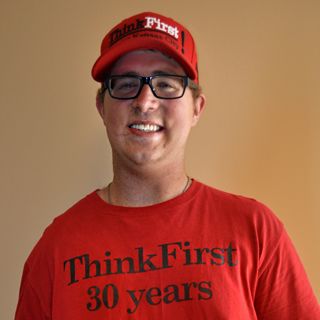
Injury Report
Date: March 19, 2009
Time: 7:19 p.m.
Place: Overland Park, KS
Patient: 16-year-old male
Factors: Passenger in a car involved in a left turn accident
Diagnosis: Traumatic brain injury, comatose for one month following injury
Prognosis: Not expected to survivePre-Injury Life
Carl's life before his car crash was careless. He did what he wanted because he thought he was invincible.Post-Injury Life
Carl now lives his life with a traumatic brain injury. He has the determination he didn't have before. The right side of his body is disabled, so he works out every day. He now has a more positive outlook on life. -
Chad
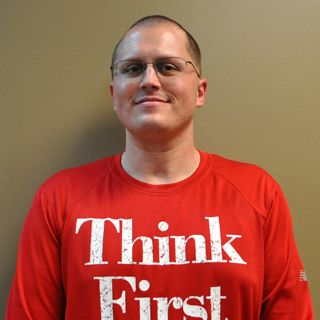
Injury Report
Date: September 4, 2005
Time: 2:00 a.m.
Place: Kansas City, Missouri
Patient: 23-year-old male, senior at Park University
Factors: Single car crash, impaired, using cell phone, no seat belt
Diagnosis: Traumatic brain injury, comatose for three-and-a-half months
Prognosis: Not expected to survivePre-Injury Life
After high school, Chad attended Maple Woods Community College and received an associate’s degree while working full-time. After graduating, he began studying business management at Park University and achieved a 4.0 GPA. He also worked full-time at a Dick’s Sporting Goods store where he was an assistant manager of the bikes and fitness department. He had his own apartment, a good group of friends and a fiancé.Post-Injury Life
As a result of his accident, Chad sustained a severe traumatic brain injury (TBI). It takes him longer to learn new things and multi-tasking has become difficult. He went back to school at Park University, but issues with his memory kept him from retaining enough material to pass the required classes. Chad got a job working part-time as a cashier at Target. But because his TBI affected his vision and reaction time, he can no longer drive. He now lives with his parents for transportation assistance. His friends and fiancé visited him after he returned from rehab, but his brain injury resulted in amnesia, leaving a four-year gap in his memory and no recollection of those he was close with. He shares his story with ThinkFirst in hopes to prevent the same thing from happening to others. -
Kelly

Injury Report
Date: September 27, 1998
Time: 4 p.m.
Patient: 25-year-old
Factors: No seat belt, driving too fast, drinking
Diagnosis: T6 complete spinal cord injury
Prognosis: Permanently paralyzed, no movement or sensation from the lower chest downPre-Injury Life
Kelly was very active before her injury. She had a bachelors degree in both health and exercise science and psychology and worked as a restaurant server. At age 25, she spent a lot of time with her friends.Post-Injury Life
The first two years after her injury required a difficult adjustment, including a procedure to stop bladder accidents. She is now a professional speaker, active military spouse, dog and animal lover and disability rights advocate. Her biggest struggle is being treated differently everyday. -
Sarah

Injury Report
Date: April 4, 1994
Time: 10:00 p.m.
Place: Parkville, Missouri
Patient: 17-year-old female, high school junior
Factors: Single car crash, passenger in a convertible with no seat belt
Diagnosis: T12 spinal cord injury
Prognosis: ParaplegicPre-Injury Life
Before her injury, Sarah was very athletic. She played volleyball and softball and loved to run, dance and work out. She planned to become a television broadcaster, had a boyfriend and good group of friends.Post-Injury Life
After sustaining her injury, Sarah had to give up certain dreams and create new ones. She has taken an interest in volunteering and traveling and enjoys spending time with her family and friends. -
Tonya
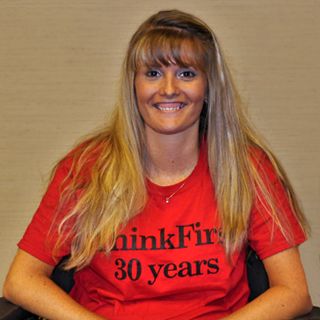
Injury Report
Date: August 8, 2004
Time: 4:20 p.m.
Patient: 17-year-old, high school senior
Factors: Single car crash, distracted and sleep deprived
Diagnosis: C5 spinal cord injury
Prognosis: QuadriplegicPre-Injury Life
Before her injury, Tonya was very active. She enjoyed playing basketball and volleyball, dancing, riding dirt bikes and four-wheelers, traveling and singing. Tonya spent most of her time having fun with friends and family. She dreamed of joining the military or, one day, becoming a trauma nurse. Most people described her as social, independent and always on the go.Post-Injury Life
Tonya still enjoys being active despite her injury. She spends as much time outdoors as possible and attends concerts and sporting events whenever she can. She misses being independent and spontaneous, so her personal goals have shifted. Tonya speaks for ThinkFirst to help others avoid preventable spinal cord injuries and change social perceptions of individuals with disabilities.
OUR HARDWARE
-
2023 VIP of the Year, Kelly Narowski
ThinkFirst National Injury Prevention Foundation
-
2017 VIP of the Year, Sarah Smith
ThinkFirst National Injury Prevention Foundation
-
2014 Tempe Humphrey Youth Safety Award
Missouri Coalition for Roadway Safety
-
2012 Show-Me Safety Award
Missouri Coalition for Roadway Safety and AAA
-
2011 People Saving People Award
Kansas Department of Transportation
-
2008 Chapter of the Year
ThinkFirst National Injury Prevention Foundation
Send us an email or call 816-276-4955 for more information.
ThinkFirst of Greater Kansas City Funders


